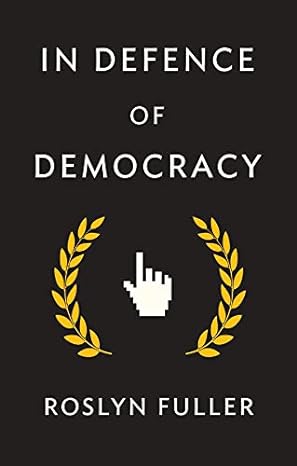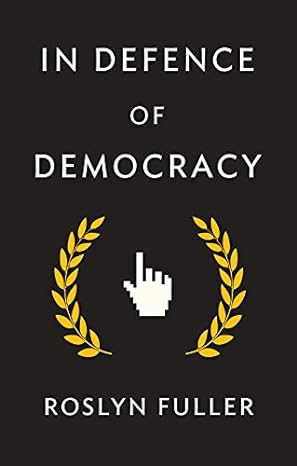Roslyn Fuller, In Defence of Democracy


Roslyn Fuller, In Defence of Democracy (Polity Press, 2019)
In previous writings here and elsewhere, I have written as if the forms of democracy that might be endorsed or criticized are pretty much exhausted by the following broad and basic categories:
- Elective (however voting is conducted)
- “Republican” (i.e., severely restricting the sorts of things the populace is allowed to do)
- “Populist” (i.e., intending to give “the people” what they want in almost every arena)
- Sortitionist (however their lotteries may be conducted)
- Direct (where people rule without need of representation)
And all of these, naturally, should be distinguished from non-democratic arrangements like anarchies, monarchies, oligarchies, and other forms of either authoritarian (on one side) or extremely libertarian/anarchic schemes (on the other).
The problem with this taxonomy is that Roslyn Fuller has recently written three compelling books on democratic theory showing that it exhibits a significant lack of imagination. While joining me in the “populist” camp (at least as “populist” is described above), Fuller’s position, without being aleatoric the way a lottery approach must be, is strictly anti-plebiscitary, because, while it accepts the necessity of representation, it is also an example of direct democracy. This combination–representative, but also direct–may seem impossible, but Fuller argues not only that such a congeries is conceivable, but that we can find an example of its implementation in the distant past. In her quite fascinating historical depiction of both the governmental procedures and general environment of fifth century B.C.E Greece, she demonstrates that just such a scheme was implemented by the thoughtful democrats of ancient Athens.
On Fuller’s view, “direct” and “representative” are contradictory only given certain understandings of those terms. In a section called “The Myth of Representation” in her (also excellent) 2015 book, Beasts and Gods: How Democracy Changed Its Meaning and Lost Its Purpose, there’s an informative discussion of representation-as-natural-proxy versus representation-as-symbolic-placeholder. So, for example, both a realistic painting and the name “Satchel” might be used to represent my pet toy poodle, but only one of these makes any attempt to resemble the little guy. Fuller’s claim is that since current electoral democracies use extremely minute percentages of individuals to “represent” a total populace, and the electorate’s involvement is generally limited to election days, such “representation” can only be of the symbolic sort. On such an understanding, it does make sense to say that representative democracies simply cannot be examples of direct government by the people. On the other hand, if everyone in a jurisdiction is invited to participate in government and many actually do so–not just by voting on rare occasions, but by active engagement in policy deliberations and government administration–it makes sense to claim that there IS “representation” of the total populace by these volunteers of the more substantial type. That’s because the “representatives” are now a natural proxy for the views of (all or most of) the people. The sort of government Fuller proposes, which she calls “Fuller Democracy” is exactly of that Athenian variety, which does in this way allow for simultaneous representation and direct democracy.
One thing Fuller democracy should not be called is “sortitionist” -- in spite of its Athenian credentials (and even if it does call for the use of lotteries for limited purposes). Contemporary advocates of sortition also claim Athenian bona fides, but Fuller argues that their historical claims are often erroneous. Their alleged misuse of “Athenian” for their own proposals may account for the fact that her characterization of modern sortionists is even harsher than her portrayal of the more candid epistocrats who consort with Jason Brennan or Bryan Caplan. Fuller is quite convincing in her claims that the most well-known contemporary sortitionists badly distort the Athenian picture, and that they should be roundly pummeled for their errors. It should be noted, however, that they aren’t the only punching bags: the entire book is delightfully polemical. Its author, the founder and director of the Solonian Democracy Institute, is clearly a firebrand, and she has written a modern manifesto that mercilessly (and wittily) bashes not only sortitionist claims, but pretty much every doctrine containing any tincture of what strikes her as anti-democratic elitism. Not everyone will agree that approach, but I find it extremely congenial: after all, this stuff is important, and populists get a bad name from almost every quarter.
What, exactly, are the problems Fuller finds with all the apparently diverse views attacked here? After all, their proponents also loudly claim to have the exclusive goal of making crucial improvements to current forms of democracy. As indicated, much of her disdain flows from what she takes to be their elitism–whether open or closeted. First and foremost, she denies that regular voters are either too stupid, too bigoted, too crazy, too uninformed, or too uninterested to be entrusted to deliberate and vote on complicated issues of public policy on a regular basis. And she repeatedly cuts the legs out of arguments by sometimes media-coddled “experts” who take themselves to be heroes of “the people,” even while insisting (on the basis of confused premises) that such insults are appropriate. Take alleged bigotry. She argues that, in 2016, Donald Trump “did not get elected because he deeply appealed to the lurking bigots around – he got elected despite the fact that many people found these aspects off-putting….Indeed 11 per cent of voters who said Trump’s treatment of women bothered them a lot still voted for him, while 73 per cent of those who said it bothered them somewhat [also] did.” It is much the same for the other accusations. Not just Brennan and Caplan, but also Larry Bartels, Daniel Bell, David van Reybrouck, Christopher Achens, Ilya Sonins, and a bunch of other know-it-alls: whether they are self-described (or commonly perceived by others) as liberals or conservatives–they are all accused of finding average citizens unworthy of suffrage based on one of the insulting accusations listed above.
What reasons do these scholars allege for claiming these deficiencies in voter capabilities? According to Fuller, it’s usually because majorities disagree with them on some matter of public policy. “You were for Brexit? You like Bolsonaro? You’re suspicious of political parties? Then you’ve shown yourself to be too dumb to be given a vote. Your suffrage should therefore be taken away and all of its authority transferred either to experts of whom I approve or to a small group of randomly selected folks whom my experts will “train” to understand what the correct views are on these issues.” Not only do I think Fuller makes very convincing arguments here, but I don’t think any of her adversaries are likely to survive the first round bell.
It is worth noting that, in spite of the fact that Fuller and I come to many of the same conclusions regarding how the concept of democracy should be unpacked, my own views are a bit different on the issue of voter competence. Largely because I deny that the sorts of public policy decisions she references can appropriately be called right or wrong in the first place, I don’t think democratic theorists should care too much about how smart, nice, or not crazy any potential voter is. This lets me avoid deciding between someone like Charlie Pierce, who simply can’t believe how idiotic American voters are, and Fuller, who insists that voters everywhere are intellectually fit and will be just fine if given more authority and maybe a bit of money to make up for the time they’ll need for Fuller-style participation. My own take is that once real democracy is exalted, the matter of intelligence becomes largely irrelevant for democratic theory–at least with respect to most types of public policy. Those who really value democracy won’t allow any anti-democratic proposal to be up for a vote in the first place. But for every other issue, each vote must be counted equally, even those made by people who are quite reasonably deemed stupid or nuts (perhaps because they believe that God-fearing people once domesticated dinosaurs and rode them around Job Ranch in the good-old days).
The same is true for the other alleged defects. Voters might be nasty bigots too, but that also should make no difference –at least for theory. After all, why wouldn’t we expect a cruel or stupid populace to make cruel or stupid policies in an authentically democratic jurisdiction? So, my sense is that the question of whether people are stupid or cruel is relevant only for other (admittedly crucial!) things like education policy or in determining where one wants to live. Those are extremely important matters too: just not for democratic theory. Real democracy must entail that even bad people get at least MOST of what they want. (Not everything, because democracy requires equality, and that, in turn, calls for non-discrimination and equal treatment of every person.)
Interestingly, Fuller flirts with my position when she writes (not quite correctly, in my opinion) that value claims can only have emanated from religious upbringing or subsequent “theological” instruction. She says that a strict reliance on “positive law” entails such a view, but that’s certainly not the position held by most followers of Austin or Hart. The main contention of legal positivism has always been that law is one thing, and morality another; that what makes some law properly enforceable is solely a matter of the procedures used to create it, not whether it is morally apt. Fuller and I both agree with that principle. But such a wall between law and ethics does not entail a religious basis for either. Fuller is evidently a denier of moral realism, which is fine with me, but that’s a separate issue, as is the causal/psychological question of whether or not anybody’s views of what is ethical stems from religious interventions.
While Fuller is certain that members of the general populace are quite up to the task of governing, she does concede that the average voter may be too busy with jobs, families, etc. to spend a ton of time discussing and amending proposals, and that such tasks may be prohibitive for those without a lot of money or extra time–just as they were in ancient Greece. But her view is that governments should subsidize this important work because “Fuller democracy” would (a) maybe for the first time in several thousand years allow for authentic popular sovereignty; (b) result in much less corruption than our current system does, because what we have now divides polities into a few important elected individuals and a huge number of powerless plebes; and (c) still be considerably cheaper than the essentially defective plebiscitary systems found all around the world, which continue to exist only because of a persistent failure to think outside the constraints of hackneyed procedures.
I may seem to have focused above on what I take to be a couple of shortcomings in this book, but they are minor, and no one should be put off by those criticisms. This is a terrific work that would be important for its informative discussion of Athenian democracy alone. It’s not only fun to read and convincing, but the issues it addresses are of the highest importance. In fact, it’s my view that Fuller is the heir apparent to Robert Dahl, and that she is currently producing the most valuable and readable contributions to political theory that anyone is likely to find anywhere. Highly recommended.

About the Author
Walter Horn is a philosopher of politics and epistemology.
His 3:16 interview is here.Other Hornbook of Democracy Book Reviews